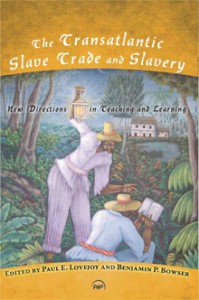 The Department of History offers its warmest congratulations to History Professor Paul Lovejoy on the publication of his latest book, a collection of essays on The Transatlantic Slave Trade and Slavery: New Directions in Teaching and Learning.
The Department of History offers its warmest congratulations to History Professor Paul Lovejoy on the publication of his latest book, a collection of essays on The Transatlantic Slave Trade and Slavery: New Directions in Teaching and Learning.
Co-edited with Benjamin Bowser, Professor Emeritus at California State University at East Bay, the volume is the product of a workshop held at the Harriet Tubman Institute here at York.
Louis Kushnick, OBE Professor Emeritus, University of Manchester, called the book an important contribution to advancing the struggle against racism. "Lovejoy and Bowser have made a major contribution in bringing together a focused collection of essays that incorporate the teaching of African history and the history of slavery. These are important components of any serious education on human rights, intercultural dialogue, peace and democratic citizenship. The importance of this education is evidenced daily in our supposedly post-race societies where vicious and indirect ways have been found to continue the oppression of people of color."
Henry Louis Gates, Jr. The Alphonse Fletcher University Professor and Director, W.E.B. Du Bois Institute for African American Research at Harvard University said, "the past two decades have witnessed a veritable revolution in our understanding of the nature and function of the slave trade from Africa to the Americas, starting with the most accurate count of the human beings enslaved between 1501 and 1866, collected in the Trans-Atlantic Slave Trade Database. And a multi-national, multi-linguistic Black Atlantic reconceptualization of African enslavement and displacement has led to the detailed revelation of astonishing connections and cross-currents of both masters and slaves throughout the Atlantic and Caribbean worlds. This volume tackles the necessary question of how we go about translating this mass of new data to our students. Benjamin Bowser, Paul Lovejoy, the Harriet Tubman Institute, and the UNESCO Slave Route Project are to be commended for tackling this important next step, head on, and in such a rich variety of ways."
And Sir Hilary Beckles, Ph.D. Principal and Professor, University of the West Indies, Cave Hill, Barbados, said "this volume reflects on what we teach and the way we teach in breaking the silence on the subject of slavery and its consequences. The Chattel enslavement of Africans on a global scale, the most extensive crime against humanity perpetrated in modernity, has many enduring legacies. Foremost among these is the persistent challenge of speaking, teaching, and learning about it. The sound of silence is everywhere; most disturbingly, in the classrooms of schools and academies the world over. Once again, we are indebted to Professor Paul Lovejoy, a warrior for reason and advocate for academic engagement in the search for solutions. He has joined forces with Benjamin Bowser and together they have provided us with a text, unique in its understanding and passionate in its pursuit of bringing the latest information and knowledge of how best to place the world of slavery at the fingertips of the teacher, student, and researcher. It's a powerfully enabling tool with which all parties to the exchange of teaching and learning will feel their empowerment. No longer will there be acceptance and tolerance of the mantra that the task is too daunting."
